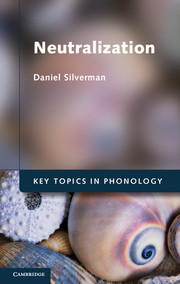Preface
Published online by Cambridge University Press: 05 November 2012
Summary
“OVERARCH”
“Neutralization” is a conditioned limitation on the distribution of a language's contrastive values.
The theses explored herein:
Most cases of neutralizing alternation are heterophone-maintaining, and are consequently function-neutral in the sense that lexical semantic distinctness remains stable.
Only in those rare instances when a neutralizing alternation is homophone-deriving might it be function-negative, in terms of potentially rendering lexical semantic content non-distinct.
Indeed, neutralization is often function-positive, as it may serve as an aid to parsing the speech stream into its functional (morphemic and lexical) components.
In all, it is proposed that neutralization may proceed largely unchecked (thus increasing what I term phonological rhyme), until encountering a passive, usage-based pressure inhibiting excessive derived homophony (that is, until phonological reason would be breached).
“UNDERGRID”
The book considers neutralization from many different theoretical vantage points and schools of linguistic thought, from Kazan, to Prague, to London, to Boston, to Los Angeles, and beyond.
The book is divided into two parts. For the bulk of the book – rhyme – I observe, describe, and explain neutralization from many different theoretical perspectives, all the while building towards a discussion of neutralization’s minor function-negative role. The shorter second part – reason – also surveys approaches to neutralization, but from a very different perspective, emphasizing its function-positive role.
- Type
- Chapter
- Information
- Neutralization , pp. xi - xiiiPublisher: Cambridge University PressPrint publication year: 2012

